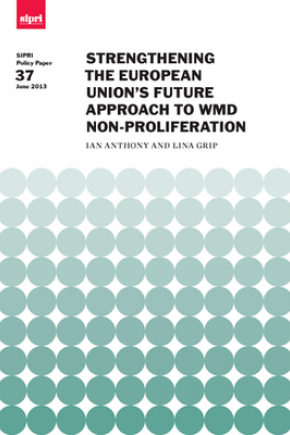Strengthening the European Union's Future Approach to WMD Non-proliferation
In the 10 years since the European Union adopted its Strategy against Proliferation of Weapons of Mass Destruction, it has succeeded in developing a distinctive approach to the non-proliferation of WMD. Developments over the decade provide a solid platform from which the EU could now expand its non-proliferation efforts in ways that increase its effectiveness and efficiency, in particular, by emphasizing the security of European citizens alongside the traditional security of the state.
This timely report explores how the EU has approached the formidable task of implementing the WMD Strategy, evaluates the degree of success that has been achieved and outlines pragmatic changes that will make the effort more effective in the future.
About the authors
Dr Ian Anthony (United Kingdom) is Head of the SIPRI European Security Project and Director of the SIPRI Arms Control and Non-proliferation Programme. He has published numerous books on issues related to arms control, disarmament and export control, including Reforming Nuclear Export Controls: The Future of the Nuclear Suppliers Group, SIPRI Research Report no. 22 (2007, co-author), and The Future of Nuclear Weapons in NATO (Friedrich-Ebert-Stiftung, 2010, co-author).
Lina Grip (Sweden) is a Researcher with the SIPRI Arms Control and Non-proliferation Programme and is SIPRI's coordinator for the EU Non-proliferation Consortium. She is also a doctoral candidate in political science at Helsinki University. Her research interests include regional and multilateral non-proliferation and arms control policies and processes, with a focus on the EU, and she has published a number of papers on the EU's non-proliferation activities.
1. Introduction
2. Changes in the threat environment: From the elimination of threats to the management of risks
3. European Union non-proliferation efforts, 2003–13
4. Ways to strengthen the European Union's future approach
5. Conclusions and recommendations


